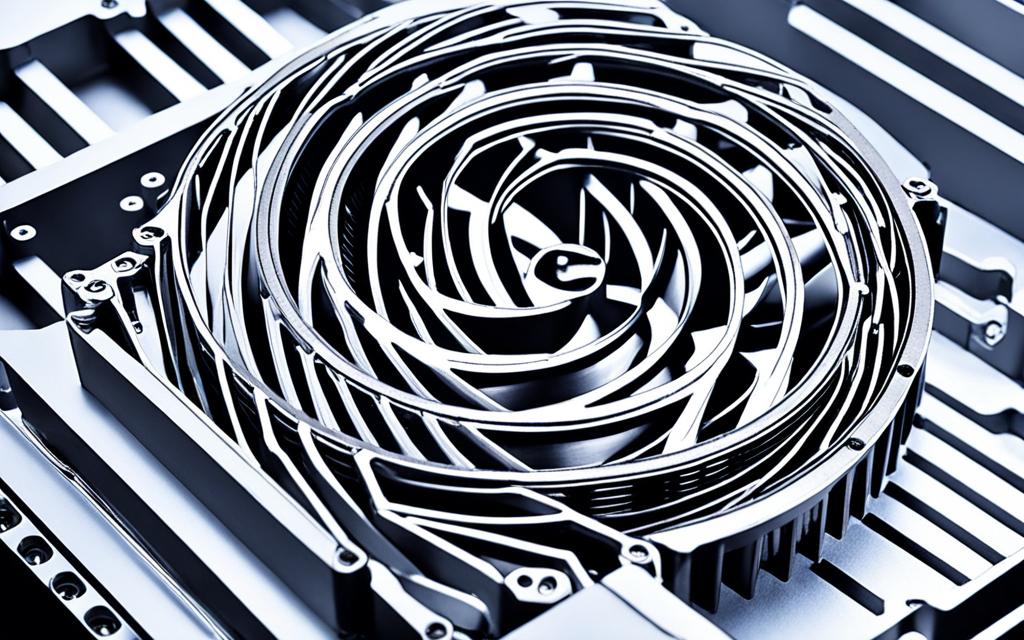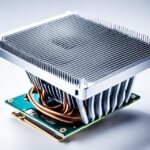Table of Contents
Choosing the right CPU cooler is crucial for your processor’s performance. It is key in keeping the processor cool and efficient. Most coolers work with both AMD and Intel CPUs, but the socket type matters. You’ll often hear about Intel’s LGA and AMD’s PGA sockets. Intel uses a range from LGA 115x to LGA 1700, while AMD mainly relies on AM4 and AM5 sockets1. Knowing these specifics helps enthusiasts choose the best cooling option.
This piece sheds light on CPU cooler compatibility. It talks about how different sockets and manufacturer specs can affect cooler performance. We also compare stock and aftermarket coolers. This gives a broad view for both newcomers and tech buffs. For more insights on building a gaming PC, check out this detailed guide.
Key Takeaways
- Compatibility hinges on CPU socket types and thermal requirements.
- Modern coolers generally support both Intel and AMD processors.
- Aftermarket coolers may require additional brackets for optimum fit.
- Checking cooler specifications is critical for ensuring a perfect match.
- Understanding TDP ratings helps in selecting the right cooling solution.
The Importance of CPU Coolers
CPU coolers keep your system at the right temperature. They stop it from getting too hot. This lets your processor work its best. When you know why coolers are important, you can choose the right one. This is crucial for when your computer needs to work hard.
Understanding CPU Cooling Needs
CPU coolers vary to meet different needs. They fit various CPUs, including Intel and2AMD. For gaming, the cooling needs go up. This is because games make processors work harder. Liquid coolers, like AIOs, do a better job and are quieter than air coolers3. Also, if you like things quiet, think about the cooler’s noise level when choosing.
Significance in Gaming and Performance
Good cooling is key for gaming. It makes your CPU perform better and last longer. The cooler’s Thermal Design Power (TDP) shows how well it can cool2. However, coolers that look good with lights might not cool the best. It’s important to research and read reviews before buying2. Understanding coolers means your system will be stable. And your gaming will be better.
Types of CPU Coolers
Exploring CPU coolers reveals many choices that fit different needs. There are mainly two types of CPU coolers: air and liquid. Each type has its unique benefits.
Air Coolers vs Liquid Coolers
Air coolers use fans and heatsinks to remove heat. They’re well-liked, especially among mid-range users. These coolers are more budget-friendly. For example, some like the Amazon Basics CPU cooler are under $30. But high-end models might cost over $100, even reaching beyond $170 for the best ones4.
Liquid coolers, or AIO coolers, use coolant to regulate temperature better. They tend to cost more at first but boast advanced features like screens now4. This technology helps keep even the most powerful CPUs, like the 13th-Gen Intel i9 and AMD Ryzen 9 7000 series, cool5.
Stock vs Aftermarket Options
Many CPUs come with stock coolers, standard in mid-range models. These stock coolzers do the job for everyday use but might not be the best for overclocking or small spaces5. For those wanting better coolzing, aftermarket coolers are a great choice. They have more advanced tech and fit various CPU generations6.
While many stick with the included stock coolers, aftermarket options offer better coolzing along with a chance to customize. They attract users looking for improved chillzing and boosted computer performance.
Factors Affecting CPU Cooler Compatibility
Choosing the right CPU cooler is not just about your preference. It involves key factors that impact compatibility. If overlooked, these factors can cause overheating, inefficiency, and damage to your hardware. Key elements include CPU socket types and the Thermal Design Power (TDP) ratings.
Understanding CPU Socket Types
CPU coolers must match the CPU socket type, like Intel’s LGA or AMD’s AM4. It is crucial to select a cooler that fits the socket to ensure a proper connection. Popular sockets include Intel LGA1151 and AMD AM4, which offer wide cooler compatibility7.
The size of the motherboard, such as ATX or Mini-ITX, also influences space and installation options. You must consider these specifications for the right cooler fit8.
Thermal Design Power (TDP) Considerations
Knowing the TDP is vital when selecting a cooler. The TDP rating shows the maximum heat a cooler can manage. Always choose a cooler with a TDP that matches or surpasses your CPU’s needs7.
Tall RAM might need low-profile coolers to fit properly. It’s important to measure the space around the CPU socket, RAM, and inside the case. This ensures the cooler fits well and performs optimally8.
Are All CPU Coolers Compatible with Any CPU?
If you’re planning to upgrade or build your own computer, it’s vital to know how CPU coolers match with different CPUs. People often get stuck choosing between the cooler that comes with the CPU and one bought separately. Your choice should balance technical details and what you need performance-wise.
Stock CPU Coolers and Compatibility
Stock CPU coolers come with the processor and fit certain types of sockets. This means they mainly work with CPUs from the same generation and make. For example, AMD’s Wraith coolers are made for various AMD processors but not for Intel ones. Changing to a different CPU or brand6 can be an issue due to this limited fit.
It’s also important to match the cooler with the CPU’s Thermal Design Power (TDP) rating. The right match prevents your computer from overheating or performing poorly when running demanding programs.
Aftermarket CPU Coolers Explained
Aftermarket CPU coolers offer a wider range of compatibility. They come with different mounting brackets for use with various CPUs, regardless of brand or generation. When picking one, consider the cooler’s size and shape to ensure it fits well and doesn’t block RAM or PCIe slots9.
Brands like Noctua and ARCTIC provide aftermarket coolers that not only cool better but also work quieter. Low-speed fans in these coolers10 mean less noise. Always check CPU compatibility lists and user reviews to choose wisely.
Steps to Check CPU Cooler Compatibility
To make sure your CPU cooler fits your system, follow a step-by-step method. Begin by identifying your CPU socket types. This is vital for making the right match. The process of checking CPU cooler compatibility covers several important points.
Determine Your CPU Socket Type
Find out which CPU socket your processor needs. This info is often in the technical specs or manual. Look for socket types like Intel’s LGA or AMD’s AM series to ensure the cooler will fit. This step is key to choosing the right cooler.
FAQ: Checking Cooler Specifications
When looking at coolers, pay close attention to the product details. Make sure the cooler’s TDP rating meets or surpasses your CPU’s to avoid overheating11. Brands like Noctua offer detailed compatibility checks for their CPU coolers with different motherboards12.
Assessing TDP Ratings
Checking TDP ratings is crucial. A mismatch between your cooler’s rating and your CPU’s needs can lead to cooling problems11. This might harm your CPU or nearby parts. Always double-check these ratings.
Measuring Cooler Clearance
Measure your case’s space to ensure the cooler will fit. Verify the CPU cooler’s dimensions, like height, length, and width11. Large air coolers might block RAM because of their size12. Opting for low-profile RAM can solve this issue.
Common Cooling Issues and Solutions
Keeping your CPU cool is crucial for your computer’s performance and life span. Different issues can lead to your CPU getting too hot or not working right. Catching these issues early helps stop damage to your computer and keeps it working well.
Overheating Problems
Overheating is a big problem that can happen if your cooling is not good enough or not set up right. It’s key to make sure the cooler’s power rating is as high as or higher than the CPU’s. Most coolers work with AMD and Intel CPUs, but some might not fit different socket types6. A good fix is to pick a cooler with a higher power rating or improve airflow in the case.
Issues with Space and Fit
Another issue is making sure the cooler fits in your computer case. When you upgrade, pick a cooler that will fit. Measuring carefully helps avoid trouble when putting it in. It’s also important to have enough room around parts like RAM and the motherboard6. Good spacing makes it easier to install and helps the cooler work better.
Best Practices When Selecting a CPU Cooler
Choosing the right CPU cooler is vital for top performance. You must do your homework on cooler compatibility before you buy one.
Researching Compatibility
Understanding the different CPU socket types is crucial to avoid problems later. Most PC cases can fit several cooling fans to help with air flow13. For instance, ATX towers usually have space for up to seven fans. This can greatly improve cooling13.
High-end CPUs get very hot and need effective cooling, either by large air coolers or water coolers14. It’s important to match cooler size to CPU socket type. This prevents installation issues and avoids harming your components14.
Considering Future Upgrades
Think about future upgrades when picking a cooler. Choose one that fits various sockets for more upgrade options later. Water coolers offer great cooling and are quieter14. But, they can be more expensive and complex, with a risk of leaks15.
Air coolers are typically cheaper and easier to fit, offering good durability15. Consider noise level, airflow, thermal performance, and longevity. Reviews and user ratings are good resources to help make your choice15.
Conclusion
Getting the right CPU cooler is key for anyone building or improving a PC. It’s easy to think all coolers work for every CPU, but that’s not true. You have to consider the socket type, how much heat the cooler can handle, and its size. For example, many coolers support sockets like AM4, LGA 1151, and TR416. They should also be able to cool the CPU properly, especially when you’re doing heavy tasks17.
Picking the best CPU cooler means looking closely at your motherboard and how much space you have. If you have a smaller motherboard, you need to be very careful with your choice16. While built-in coolers like the AMD Wraith series are okay, other coolers in the market often cool better and make less noise1718.
So, doing your homework and choosing carefully is essential. Finding a cooler that fits well and boosts your CPU’s performance and life is crucial. This way, you build a more reliable and powerful PC. This follows the smart, cost-saving ways of the PC building community.
FAQ
Are all CPU coolers compatible with any CPU?
No, they aren’t all compatible. Compatibility depends on the CPU’s socket type and the cooler’s specs. It’s crucial to check if the cooler fits your CPU’s socket. Also, make sure it can handle your CPU’s heat output.
What types of CPU coolers are available?
There are mainly two kinds: air coolers and liquid coolers. Air coolers use fans and heatsinks to manage heat. Liquid coolers use coolant for better temperature control. There are also stock coolers that come with CPUs and aftermarket coolers for more options.
How do I determine my CPU socket type?
Check your processor’s manual or look online to find your CPU socket type. This is key to picking the right cooler.
What considerations should I have regarding TDP when selecting a cooler?
The cooler’s TDP rating should match or exceed your CPU’s rating. TDP shows the maximum heat a cooler can deal with. This helps avoid overheating and damage.
What are some common cooling issues I might encounter?
Overheating can happen with poor cooling solutions or if the cooler is not aligned right. Space issues might also occur with new parts, affecting cooling.
How can I ensure there’s enough space for my cooler?
Check your case size and ensure the cooler fits. Make sure it won’t hit other parts like RAM or the motherboard.
Why is it important to consider future upgrades when selecting a CPU cooler?
Choosing a versatile cooler saves time and money later. A cooler that fits various sockets is better for upgrades. This way, your cooling system lasts longer and works more efficiently.
How does the choice between stock and aftermarket coolers impact performance?
Stock coolers might not suit every CPU well, offering basic performance. Aftermarket coolers, however, usually offer better cooling and fit more CPU types. They’re generally more efficient and compatible across different systems.
Source Links
- https://www.corsair.com/us/en/explorer/diy-builder/cpu-coolers/aio-liquid-cpu-cooler-compatibility-with-cpus-and-motherboards/ – Which AIO Coolers are compatible with which CPUs and motherboards
- https://www.makeuseof.com/what-to-look-for-when-buying-a-cpu-cooler/ – 8 Factors to Consider Before Buying a CPU Cooler
- https://www.linkedin.com/pulse/choosing-right-cpu-cooling-fan-your-build-factors-consider-liang-dehec – Choosing the Right CPU Cooling Fan for Your Build: Factors to Consider
- https://www.tomshardware.com/reviews/best-cpu-coolers,4181.html – Best CPU Coolers 2024: AIO and Air Coolers
- https://www.makeuseof.com/types-of-cpu-coolers-which-should-you-use/ – The 3 Types of CPU Coolers (and Which One You Should Use)
- https://www.overclockers.co.uk/blog/how-to-check-cpu-cooler-compatibility/ – How to check CPU cooler compatibility
- https://softwareg.com.au/blogs/computer-hardware/are-all-cpu-coolers-compatible – Are All CPU Coolers Compatible
- https://thetechsnews.com/do-all-cpu-coolers-fit-all-motherboards/ – Do All Cpu Coolers Fit All Motherboards – A Complete Guide In 2024!
- https://noctua.at/en/buying-guide-cpu-coolers – Buying guide CPU coolers
- https://forum.level1techs.com/t/cpu-coolers-for-threadripper-7000-do-threadripper-5000-series-fit/203762 – CPU Coolers for Threadripper 7000? Do Threadripper 5000 series fit?
- https://softwareg.com.au/blogs/computer-hardware/how-to-know-if-a-cpu-cooler-is-compatible – How To Know If A CPU Cooler Is Compatible
- https://www.cgdirector.com/check-cpu-cooler-compatibility-motherboard-ram-case/ – How To Check CPU Cooler Compatibility with Motherboard, RAM, and Case
- https://www.pcmag.com/how-to/pc-cooling-101-how-to-buy-the-right-air-or-water-cooler-for-your-desktop – PC Cooling 101: How to Buy the Right Air or Water Cooler for Your Desktop CPU
- https://primetechsupport.com/blogs/gaming-pc-repairs/choosing-the-right-cpu-cooler-keep-your-gaming-pc-cool – Choosing The Right CPU Cooler: Keep Your Gaming PC Cool
- https://www.linkedin.com/advice/3/what-some-best-cpu-coolers-overclocking-your-pc-skills-pc-building – What are some of the best CPU coolers for overclocking your PC?
- https://ms.codes/en-ca/blogs/computer-hardware/do-all-cpu-coolers-fit-all-motherboards – Do All CPU Coolers Fit All Motherboards
- https://blog.logicalincrements.com/2021/08/aftermarket-cpu-cooler-guide/ – Beginner’s Guide to CPU Coolers – Logical Increments Blog
- https://softwareg.com.au/blogs/computer-hardware/are-all-cpu-coolers-the-same-size – Are All CPU Coolers The Same Size








